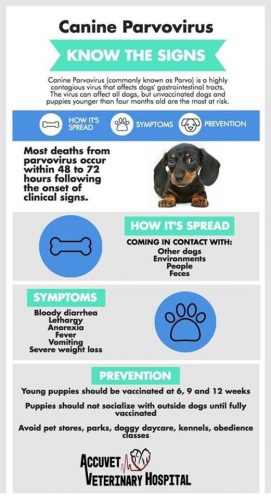
[ad_1]
There has been a noticeable increase in canine parvovirus infections during the spring and summer months, said the Tshwane SPCA this week.
Puppies should receive their first vaccination at the age of six weeks, then two other vaccines at the age of 9 and 12 weeks to avoid any infection, said the veterinarian of the Medical Center of the SPCA, Marianna Bergh, Pretoria East Rekord.
ALSO READ: Epidemic of deadly virus in dogs
What is the canine parvovirus?
Canine parvovirus is a highly contagious disease that is easily transmitted from dog to dog through direct or indirect contact with the stool.
Bergh explained that dogs could be infected by oral contact with canine parvovirus present in feces, infected soil or fomites, objects or substances that may carry infectious organisms.
"The virus attacks rapidly dividing cells such as lymph nodes, intestinal mucosa and bone marrow," she said.
This results in a decrease in white blood cells necessary for the functioning of the immune system, which delays the recovery of infected puppies.
She added that the rapid death of the intestinal cells resulted in ruptured intestinal mucosa, vomiting, diarrhea and severe intestinal bleeding.
"This can eventually lead to your puppy's death if it's not treated."
What are the symptoms to watch for?
– Lethargy
– Vomiting
– anorexia
– Bloody diarrhea
– dehydration
What can a dog owner do if he suspects that his dog has been infected?
Bergh said that dog owners should bring their dogs to a veterinarian immediately if they suspect the parvovirus.
"The prognosis for a dog with parvo's improves if treatment is started early."
She stated that, although statistics are not readily available because some owners do not consult their pets, it was noted that the number of canine parvovirus cases increased in spring and summer and decreased in winter.
How can dog owners protect their pets from the virus?
The only way to prevent parvovirus is vaccination.
"Your veterinarian will evaluate your puppy during his first visit and will give you the dates of the follow-up vaccinations."
Dogs are usually vaccinated every year, including against parvovirus.
"If you have a pup with parvovirus, you need to take precautions when introducing new puppies into your environment because the parvovirus persists in the environment for long periods of time.
"With parvovirus, as with many other viruses that affect dogs, prevention is better than cure," said Bergh.

Infographic: Veterinary Hospital Accuvet
For more information, download The Citizen app for iOS and Android.
[ad_2]
Source link